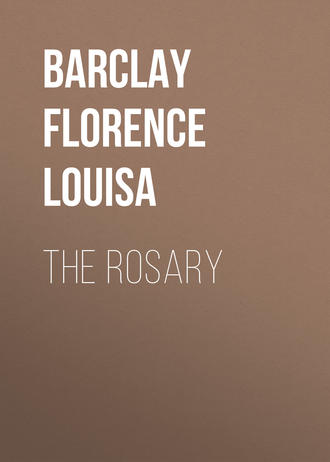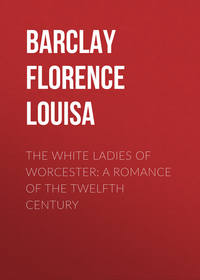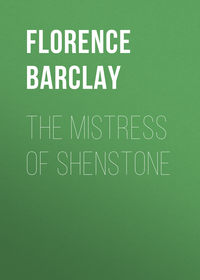 полная версия
полная версияThe Rosary
"Yes," proceeded Nurse Rosemary, encouraged. "Do you suppose, for a moment, that that lady's mirror has ever shown her a reflection in any way approaching what you have made her in these pictures? When we stand before our looking-glasses, Mr. Dalmain, scowling anxiously at hats and bows, and partings, we usually look our very worst; and that lady, at her very worst, would be of a most discouraging plainness."
Garth sat perfectly silent.
"Depend upon it," continued Nurse Rosemary, "she never sees herself as 'The Wife'—'The Mother.' Is she a wife?".
Garth hesitated only the fraction of a second. "Yes," he said, very quietly.
Jane's hands flew to her breast. Her heart must be held down, or he would hear it throbbing.
Nurse Rosemary's voice had in it only a slight tremor, when she spoke again.
"Is she a mother?"
"No," said Garth. "I painted what might have been."
"If—?"
"If it HAD been," replied Garth, curtly.
Nurse Rosemary felt rebuked. "Dear Mr. Dalmain," she said, humbly; "I realise how officious I must seem to you, with all these questions, and suggestions. But you must blame the hold these wonderful paintings of yours have taken on my mind. Oh, they are beautiful—beautiful!"
"Ah," said Garth, the keen pleasure of the artist springing up once more. "Miss Gray, I have somewhat forgotten them. Have you them here? That is right. Put them up before you, and describe them to me. Let me hear how they struck you, as pictures." Jane rose, and went to the window. She threw it open; and as she breathed in the fresh air, breathed out a passionate prayer that her nerve, her voice, her self-control might not fail her, in this critical hour. She herself had been convicted by Garth's pictures. Now she must convince Garth, by her description of them. He must be made to believe in the love he had depicted.
Then Nurse Rosemary sat down; and, in the gentle, unemotional voice, which was quite her own, described to the eager ears of the blind artist, exactly what Jane had seen in the studio.
It was perfectly done. It was mercilessly done. All the desperate, hopeless, hunger for Jane, awoke in Garth; the maddening knowledge that she had been his, and yet not his; that, had he pressed for her answer that evening, it could not have been a refusal; that the cold calculations of later hours, had no place in those moments of ecstasy. Yet—he lost her—lost her! Why? Ah, why? Was there any possible reason other than the one she gave?
Nurse Rosemary's quiet voice went on, regardless of his writhings. But she was drawing to a close. "And it is such a beautiful crimson rambler, Mr. Dalmain," she said. "I like the idea of its being small and in bud, in the first picture; and blooming in full glory, in the second."
Garth pulled himself together and smiled. He must not give way before this girl.
"Yes," he said; "I am glad you noticed that. And, look here. We will not destroy them at once. Now they are found, there is no hurry. I am afraid I am giving you a lot of trouble; but will you ask for some large sheets of brown paper, and make a package, and write upon it: 'Not to be opened,' and tell Margery to put them back in the studio. Then, when I want them, at any time, I shall have no difficulty in identifying them."
"I am so glad," said Nurse Rosemary. "Then perhaps the plain lady—"
"I cannot have her spoken of so," said Garth, hotly. "I do not know what she thought of herself—I doubt if she ever gave a thought to self at all. I do not know what you would have thought of her. I can only tell you that, to me, hers is the one face which is visible in my darkness. All the loveliness I have painted, all the beauty I have admired, fades from my mental vision, as wreaths of mist; flutters from memory's sight, as autumn leaves. Her face alone abides; calm, holy, tender, beautiful,—it is always before me. And it pains me that one who has only seen her as MY hand depicted her should speak of her as plain."
"Forgive me," said Nurse Rosemary, humbly. "I did not mean to pain you, sir. And, to show you what your pictures have done for me, may I tell you a resolution I made in the studio? I cannot miss what they depict—the sweetest joys of life—for want of the courage to confess myself wrong; pocket my pride; and be frank and humble. I am going to write a full confession to my young man, as to my share of the misunderstanding which has parted us. Do you think he will understand? Do you think he will forgive?"
Garth smiled. He tried to call up an image of a pretty troubled face, framed in a fluffy setting of soft fair hair. It harmonised so little with the voice; but it undoubtedly was Nurse Rosemary Gray, as others saw her.
"He will be a brute if he doesn't, child," he said.
CHAPTER XXXI
IN LIGHTER VEIN
Dinner that evening, the first at their small round table, was a great success. Nurse Rosemary's plans all worked well; and Garth delighted in arrangements which made him feel less helpless.
The strain of the afternoon brought its reaction of merriment. A little judicious questioning drew forth further stories of the duchess and her pets; and Miss Champion's name came in with a frequency which they both enjoyed.
It was a curious experience for Jane, to hear herself described in Garth's vivid word-painting. Until that fatal evening at Shenstone, she had been remarkably free from self-consciousness; and she had no idea that she had a way of looking straight into people's eyes when she talked to them, and that that was what muddled up "the silly little minds of women who say they are afraid of her, and that she makes them nervous! You see she looks right into their shallow shuffling little souls, full of conceited thoughts about themselves, and nasty ill-natured thoughts about her; and no wonder they grow panic-stricken, and flee; and talk of her as 'that formidable Miss Champion.' I never found her formidable; but, when I had the chance of a real talk with her, I used to be thankful I had nothing of which to be ashamed. Those clear eyes touched bottom every time, as our kindred over the water so expressively put it."
Neither had Jane any idea that she always talked with a poker, if possible; building up the fire while she built up her own argument; or attacking it vigorously, while she demolished her opponent's; that she stirred the fire with her toe, but her very smart boots never seemed any the worse; that when pondering a difficult problem, she usually stood holding her chin in her right hand, until she had found the solution. All these small characteristics Garth described with vivid touch, and dwelt upon with a tenacity of remembrance, which astonished Jane, and revealed him, in his relation to herself three years before, in a new light.
His love for her had been so suddenly disclosed, and had at once had to be considered as a thing to be either accepted or put away; so that when she decided to put it away, it seemed not to have had time to become in any sense part of her life. She had viewed it; realised all it might have meant; and put it from her.
But now she understood how different it had been for Garth. During the week which preceded his declaration, he had realised, to the full, the meaning of their growing intimacy; and, as his certainty increased, he had more and more woven her into his life; his vivid imagination causing her to appear as his beloved from the first; loved and wanted, when as yet they were merely acquaintances; kindred spirits; friends.
To find herself thus shrined in his heart and memory was infinitely touching to Jane; and seemed to promise, with sweet certainty, that it would not be difficult to come home there to abide, when once all barriers between them were removed.
After dinner, Garth sat long at the piano, filling the room with harmony. Once or twice the theme of The Rosary crept in, and Jane listened anxiously for its development; but almost immediately it gave way to something else. It seemed rather to haunt the other melodies, than to be actually there itself.
When Garth left the piano, and, guided by the purple cord, reached his chair, Nurse Rosemary said gently "Mr. Dalmain, can you spare me for a few days at the end of this week?"
"Oh, why?" said Garth. "To go where? And for how long? Ah, I know I ought to say: 'Certainly! Delighted!' after all your goodness to me. But I really cannot! You don't know what life was without you, when you week-ended! That week-end seemed months, even though Brand was here. It is your own fault for making yourself so indispensable."
Nurse Rosemary smiled. "I daresay I shall not be away for long," she said. "That is, if you want me, I can return. But, Mr. Dalmain, I intend to-night to write that letter of which I told you. I shall post it to-morrow. I must follow it up almost immediately. I must be with him when he receives it, or soon afterwards. I think—I hope—he will want me at once. This is Monday. May I go on Thursday?"
Poor Garth looked blankly dismayed.
"Do nurses, as a rule, leave their patients, and rush off to their young men in order to find out how they have liked their letters?" he inquired, in mock protest.
"Not as a rule, sir," replied Nurse Rosemary, demurely. "But this is an exceptional case."
"I shall wire to Brand."
"He will send you a more efficient and more dependable person."
"Oh you wicked little thing!" cried Garth. "If Miss Champion were here, she would shake you! You, know perfectly well that nobody could fill your place!"
"It is good of you to say so, sir," replied Nurse Rosemary, meekly. "And is Miss Champion much addicted to shaking people?"
"Don't call me 'sir'! Yes; when people are tiresome she often says she would like to shake them; and one has a mental vision of how their teeth would chatter. There is a certain little lady of our acquaintance whom we always call 'Mrs. Do-and-don't.' She isn't in our set; but she calls upon it; and sometimes it asks her to lunch, for fun. If you inquire whether she likes a thing, she says: 'Well, I do, and I don't.' If you ask whether she is going to a certain function, she says: 'Well, I am, and I'm not.' And if you send her a note, imploring a straight answer to a direct question, the answer comes back: 'Yes AND no.' Miss Champion used to say she would like to take her up by the scruff of her feather boa, and shake her, asking at intervals: 'Shall I stop?' so as to wring from Mrs. Do-and-don't a definite affirmative, for once."
"Could Miss Champion carry out such a threat? Is she a very massive person?"
"Well, she could, you know; but she wouldn't. She is most awfully kind, even to little freaks she laughs at. No, she isn't massive. That word does not describe her at all. But she is large, and very finely developed. Do you know the Venus of Milo? Yes; in the Louvre. I am glad you know Paris. Well, just imagine the Venus of Milo in a tailor-made coat and skirt,—and you have Miss Champion."
Nurse Rosemary laughed, hysterically. Either the Venus of Milo, or Miss Champion, or this combination of both, proved too much for her.
"Little Dicky Brand summed up Mrs. Do-and-don't rather well," pursued Garth. "She was calling at Wimpole Street, on Lady Brand's 'at home' day. And Dicky stood talking to me, in his black velvets and white waistcoat, a miniature edition of Sir Deryck. He indicated Mrs. Do-and-don't on a distant lounge, and remarked: 'THAT lady never KNOWS; she always THINKS. I asked her if her little girl might come to my party, and she said: "I think so." Now if she had asked ME if I was coming to HER party, I should have said: "Thank you; I am." It is very trying when people only THINK about important things, such as little girls and parties; because their thinking never amounts to much. It does not so much matter what they think about other things—the weather, for instance; because that all happens, whether they think or not. Mummie asked that lady whether it was raining when she got here; and she said: "I THINK not." I can't imagine why Mummie always wants to know what her friends think about the weather. I have heard her ask seven ladies this afternoon whether it is raining. Now if father or I wanted to know whether it was raining we should just step over to the window, and look out; and then come back and go do with really interesting conversation. But Mummie asks them whether it is raining, or whether they think it has been raining, or is going to rain; and when they have told her, she hurries away and asks somebody else. I asked the thinking lady in the feather thing, whether she knew who the father and mother were, of the young lady whom Cain married; and she said: "Well, I do; and I don't." I said: "If you DO, perhaps you will tell me. And if you DON'T, perhaps you would like to take my hand, and we will walk over together and ask the Bishop—the one with the thin legs, and the gold cross, talking to Mummie." But she thought she had to go, quite in a hurry. So I saw her off; and then asked the Bishop alone. Bishops are most satisfactory kind of people; because they are quite sure about everything; and you feel safe in quoting them to Nurse. Nurse told Marsdon that this one is in "sheep's clothing," because he wears a gold cross. I saw the cross; but I saw no sheep's clothing. I was looking out for the kind of woolly thing our new curate wears on his back in church. Should you call that "sheep's clothing"? I asked father, and he said: "No. Bunny-skin." And mother seemed as shocked as if father and I had spoken in church, instead of just as we came out. And she said: "It is a B.A. hood." Possibly she thinks "baa" is spelled with only one "a." Anyway father and I felt it best to let the subject drop.'"
Nurse Rosemary laughed. "How exactly like Dicky," she said. "I could hear his grave little voice, and almost see him pull down his small waistcoat!"
"Why, do you know the little chap?" asked Garth.
"Yes," replied Nurse Rosemary; "I have stayed with them. Talking to Dicky is an education; and Baby Blossom is a sweet romp. Here comes Simpson. How quickly the evening has flown. Then may I be off on Thursday?"
"I am helpless," said Garth. "I cannot say 'no.' But suppose you do not come back?"
"Then you can wire to Dr. Brand."
"I believe you want to leave me," said Garth reproachfully.
"I do, and I don't!" laughed Nurse Rosemary; and fled from his outstretched hands.
When Jane had locked the letter-bag earlier that evening, and handed it to Simpson, she had slipped in two letters of her own. One was addressed to
Georgina, Duchess of Meldrum
Portland Place
The other, to
Sir Deryck Brand
Wimpole Street
Both were marked: Urgent. If absent, forward immediately.
CHAPTER XXXII
AN INTERLUDE
Tuesday passed uneventfully, to all outward seeming.
There was nothing to indicate to Garth that his secretary had sat up writing most of the night; only varying that employment by spending long moments in silent contemplation of his pictures, which had found a temporary place of safety, on their way back to the studio, in a deep cupboard in her room, of which she had the key.
If Nurse Rosemary marked, with a pang of tender compunction, the worn look on Garth's face, telling how mental suffering had chased away sleep; she made no comment thereupon.
Thus Tuesday passed, in uneventful monotony.
Two telegrams had arrived for Nurse Gray in the course of the morning. The first came while she was reading a Times leader aloud to Garth. Simpson brought it in, saying: "A telegram for you, miss."
It was always a source of gratification to Simpson afterwards, that, almost from the first, he had been led, by what he called his "unHaided HintuHition," to drop the "nurse," and address Jane with the conventional "miss." In time he almost convinced himself that he had also discerned in her "a Honourable"; but this, Margery Graem firmly refused to allow. She herself had had her "doots," and kept them to herself; but all Mr. Simpson's surmisings had been freely expressed and reiterated in the housekeeper's room; and never a word about any honourable lead passed Mr. Simpson's lips. Therefore Mrs. Graem berated him for being so ready to "go astray and speak lies." But Maggie, the housemaid, had always felt sure Mr. Simpson knew more than he said. "Said more than he knew, you mean," prompted old Margery. "No," retorted Maggie, "I know what I said; and I said what I meant." "You may have said what you meant, but you did not mean what you knew," insisted Margery; "and if anybody says another word on the matter, I shall say grace and dismiss the table," continued old Margery, exercising the cloture, by virtue of her authority, in a way which Simpson and Maggie, who both wished for cheese, afterwards described as "mean."
But this was long after the uneventful Tuesday, when Simpson entered, with a salver; and, finding Jane enveloped in the Times, said: "A telegram for you, miss."
Nurse Rosemary took it; apologised for the interruption, and opened it. It was from the duchess, and ran thus:
MOST INCONVENIENT, AS YOU VERY WELL KNOW; BUT AM LEAVING EUSTON TO-NIGHT. WILL AWAIT FURTHER ORDERS AT ABERDEEN.
Nurse Rosemary smiled, and put the telegram into her pocket. "No answer, thank you, Simpson."
"Not bad news, I hope?" asked Garth.
"No," replied Nurse Rosemary; "but it makes my departure on Thursday imperative. It is from an old aunt of mine, who is going to my 'young man's' home. I must be with him before she is, or there will be endless complications."
"I don't believe he will ever let you go again, when once he gets you back," remarked Garth, moodily.
"You think not?" said Nurse Rosemary, with a tender little smile, as she took up the paper, and resumed her reading.
The second telegram arrived after luncheon. Garth was at the piano, thundering Beethoven's Funeral March on the Death of a Hero. The room was being rent asunder by mighty chords; and Simpson's smug face and side-whiskers appearing noiselessly in the doorway, were an insupportable anticlimax. Nurse Rosemary laid her finger on her lips; advanced with her firm noiseless tread, and took the telegram. She returned to her seat and waited until the hero's obsequies were over, and the last roll of the drums had died away. Then she opened the orange envelope. And as she opened it, a strange thing happened. Garth began to play The Rosary. The string of pearls dropped in liquid sound from his fingers; and Nurse Rosemary read her telegram. It was from the doctor, and said: SPECIAL LICENSE EASILY OBTAINED. FLOWER AND I WILL COME WHENEVER YOU WISH. WIRE AGAIN.
The Rosary drew to a soft melancholy close.
"What shall I play next?" asked Garth, suddenly.
"Veni, Creator Spiritus," said Nurse Rosemary; and bowed her head in prayer.
CHAPTER XXXIII
"SOMETHING IS GOING TO HAPPEN!"
Wednesday dawned; an ideal First of May: Garth was in the garden before breakfast. Jane heard him singing, as he passed beneath her window.
"It is not mine to sing the stately grace, The great soul beaming in my lady's face."
She leaned out.
He was walking below in the freshest of white flannels; his step so light and elastic; his every movement so lithe and graceful; the only sign of his blindness the Malacca cane he held in his hand, with which he occasionally touched the grass border, or the wall of the house. She could only see the top of his dark head. It might have been on the terrace at Shenstone, three years before. She longed to call from the window; "Darling—my Darling! Good morning! God bless you to-day."
Ah what would to-day bring forth;—the day when her full confession, and explanation, and plea for pardon, would reach him? He was such a boy in many ways; so light-hearted, loving, artistic, poetic, irrepressible; ever young, in spite of his great affliction. But where his manhood was concerned; his love; his right of choice and of decision; of maintaining a fairly-formed opinion, and setting aside the less competent judgment of others; she knew him rigid, inflexible. His very pain seemed to cool him, from the molten lover, to the bar of steel.
As Jane knelt at her window that morning, she had not the least idea whether the evening would find her travelling to Aberdeen, to take the night mail south; or at home forever in the heaven of Garth's love.
And down below he passed again, still singing:
"But mine it is to follow in her train;Do her behests in pleasure or in pain;Burn at her altar love's sweet frankincense,And worship her in distant reverence.""Ah, beloved!" whispered Jane, "not 'distant.' If you want her, and call her, it will be to the closest closeness love can devise. No more distance between you and me."
And then, in the curious way in which inspired words will sometimes occur to the mind quite apart from their inspired context, and bearing a totally different meaning from that which they primarily bear, these words came to Jane: "For He is our peace, Who hath made both one, and hath broken down the middle wall of partition between us … that He might reconcile both … by the cross." "Ah, dear Christ!" she whispered. "If Thy cross could do this for Jew and Gentile, may not my boy's heavy cross, so bravely borne, do it for him and for me? So shall we come at last, indeed, to 'kiss the cross.'"
The breakfast gong boomed through the house. Simpson loved gongs. He considered them "Haristocratic." He always gave full measure.
Nurse Rosemary went down to breakfast.
Garth came in, through the French window, humming "The thousand beauties that I know so well." He was in his gayest, most inconsequent mood. He had picked a golden rosebud in the conservatory and wore it in his buttonhole. He carried a yellow rose in his hand.
"Good day, Miss Rosemary," he said. "What a May Day! Simpson and I were up with the lark; weren't we, Simpson? Poor Simpson felt like a sort of 'Queen of the May,' when my electric bell trilled in his room, at 5 A.M. But I couldn't stay in bed. I woke with my something-is-going-to-happen feeling; and when I was a little chap and woke with that, Margery used to say: 'Get up quickly then, Master Garth, and it will happen all the sooner.' You ask her if she didn't, Simpson. Miss Gray, did you ever learn: 'If you're waking call me early, call me early, mother dear'? I always hated that young woman! I should think, in her excited state, she would have been waking long before her poor mother, who must have been worn to a perfect rag, making all the hussy's May Queen-clothes, overnight."
Simpson had waited to guide him to his place at the table. Then he removed the covers, and left the room.
As soon as he had closed the door behind him, Garth leaned forward, and with unerring accuracy laid the opening rose upon Nurse Rosemary's plate.
"Roses for Rosemary," he said. "Wear it, if you are sure the young man would not object. I have been thinking about him and the aunt. I wish you could ask them both here, instead of going away on Thursday. We would have the 'maddest, merriest time!' I would play with the aunt, while you had it out with the young man. And I could easily keep the aunt away from nooks and corners, because my hearing is sharper than any aunt's eyes could be, and if you gave a gentle cough, I would promptly clutch hold of auntie, and insist upon being guided in the opposite direction. And I would take her out in the motor; and you and the young man could have the gig. And then when all was satisfactorily settled, we could pack them off home, and be by ourselves again. Ah, Miss Gray, do send for them, instead of leaving me on Thursday."
"Mr. Dalmain," said Nurse Rosemary, reprovingly, as she leaned forward and touched his right hand with the rim of his saucer, "this May-Day morning has gone to your head. I shall send for Margery. She may have known the symptoms, of old."
"It is not that," said Garth. He leaned forward and spoke confidentially. "Something is going to happen to-day, little Rosemary. Whenever I feel like this, something happens. The first time it occurred, about twenty-five years ago, there was a rocking-horse in the hall, when I ran downstairs! I have never forgotten my first ride on that rocking-horse. The fearful joy when he went backward; the awful plunge when he went forward; and the proud moment when it was possible to cease clinging to the leather pommel. I nearly killed the cousin who pulled out his tail. I thrashed him, then and there, WITH the tail; which was such a silly thing to do; because, though it damaged the cousin, it also spoiled the tail. The next time—ah, but I am boring you!"





